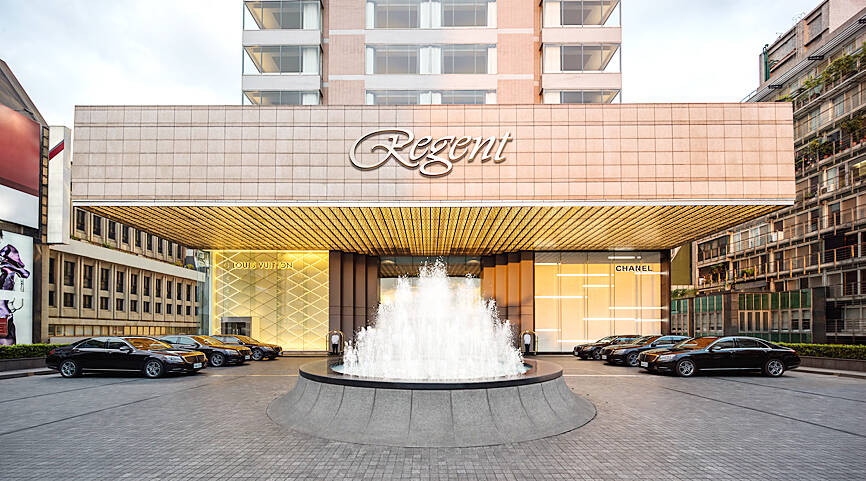Formosa International Hotels Corp (FIH, 晶華國際酒店集團) yesterday announced plans to distribute cash dividends of NT$11.38 per share, higher than the earnings per share of NT$11.11 it made last year.
The company, which owns the Regent Taipei (台北晶華酒店), Silks Place (晶英酒店) and Just Sleep Hotel & Resort (捷絲旅) brands, reported net income of NT$1.53 billion (US$48.7 million) for last year, a sharp improvement of 50.31 percent from 2022.
FIH attributed the growth to sturdy beverage and food sales, as guest room revenue performed poorly due to a decrease in foreign arrivals.

Photo courtesy of Formosa International Hotels Corp
The company expects its food and beverage business to thrive in the first half of the year on the back of business gatherings, national holidays and trade shows, and plans to boost guest room and dining revenues in the second half of the year with assorted promotion packages and by collaborating with tourism partners, it said.
Meanwhile, My Humble House Hospitality Management Consulting Co (寒舍餐旅) last week reported a record net income of NT$414 million for last year, or earnings per share of NT$4.52.
My Humble House, which operates Le Meridien Taipei (台北寒舍艾美酒店), Sheraton Grand Taipei Hotel (台北喜來登大飯店) and Mu Jiaosi Hotel (礁溪寒沐), said it registered double-digit gains in room occupancy and food sales last year.

When an apartment comes up for rent in Germany’s big cities, hundreds of prospective tenants often queue down the street to view it, but the acute shortage of affordable housing is getting scant attention ahead of today’s snap general election. “Housing is one of the main problems for people, but nobody talks about it, nobody takes it seriously,” said Andreas Ibel, president of Build Europe, an association representing housing developers. Migration and the sluggish economy top the list of voters’ concerns, but analysts say housing policy fails to break through as returns on investment take time to register, making the

NOT TO WORRY: Some people are concerned funds might continue moving out of the country, but the central bank said financial account outflows are not unusual in Taiwan Taiwan’s outbound investments hit a new high last year due to investments made by contract chipmaker Taiwan Semiconductor Manufacturing Co (TSMC, 台積電) and other major manufacturers to boost global expansion, the central bank said on Thursday. The net increase in outbound investments last year reached a record US$21.05 billion, while the net increase in outbound investments by Taiwanese residents reached a record US$31.98 billion, central bank data showed. Chen Fei-wen (陳斐紋), deputy director of the central bank’s Department of Economic Research, said the increase was largely due to TSMC’s efforts to expand production in the US and Japan. Investments by Vanguard International

WARNING SHOT: The US president has threatened to impose 25 percent tariffs on all imported vehicles, and similar or higher duties on pharmaceuticals and semiconductors US President Donald Trump on Wednesday suggested that a trade deal with China was “possible” — a key target in the US leader’s tariffs policy. The US in 2020 had already agreed to “a great trade deal with China” and a new deal was “possible,” Trump said. Trump said he expected Chinese President Xi Jinping (習近平) to visit the US, without giving a timeline for his trip. Trump also said that he was talking to China about TikTok, as the US seeks to broker a sale of the popular app owned by Chinese firm ByteDance Ltd (字節跳動). Trump last week said that he had

STRUGGLING TO SURVIVE: The group is proposing a consortium of investors, with Tesla as the largest backer, and possibly a minority investment by Hon Hai Precision Nissan Motor Co shares jumped after the Financial Times reported that a high-level Japanese group has drawn up plans to seek investment from Elon Musk’s Tesla Inc to aid the struggling automaker. The group believes the electric vehicle (EV) maker is interested in acquiring Nissan’s plants in the US, the newspaper reported, citing people it did not identify. The proposal envisions a consortium of investors, with Tesla as the largest backer, but also includes the possibility of a minority investment by Hon Hai Precision Industry Co (鴻海精密) to prevent a full takeover by the Apple supplier, the report said. The group is